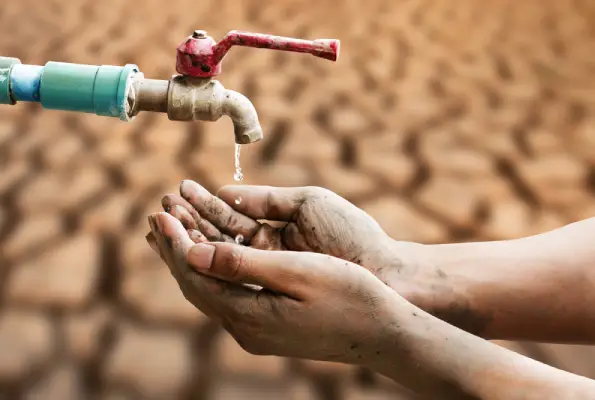Climate change causes water stress for 83% of Middle East and North Africa (MENA) residents, according to the World Resources Institute.
Although the world’s wealthiest in natural resources, Saudi Arabia is one of the most water-scarce. The Kingdom has 89.5 cubic meters per capita, compared to 500 cubic meters globally.
In the world’s most desert region, Saudi Arabia and its neighbours must provide a decent standard of living when water bodies dry up due to long-term temperature and weather changes.
Saudi Arabia is using its influence at the G20 intergovernmental meeting and the Clean Energy Ministerial to promote environmental and regional competence.
At COP28 in Dubai, Jean-Francois Gagne, leader of the Clean Energy Ministerial secretariat, underlined the need for regional coordination in attaining climate change aspirations.
“Due to its G20 membership, Saudi Arabia can lead the world discussion on regional expertise and environmental issues. We need all regions of the world to progress together,” Jean-Francois Gagne told Arab News.
“When you have regional champions, it really helps you advance our clean energy goals without leaving anyone behind,” he added further.
Recently, Saudis have seen climate change challenges differently.
Saudi consumers are aware of climate issues and optimistic about solving them, according to the Ecolab Watermark Study, a global survey of water perception in 15 nations.
The 2023 study found that 53% of Saudi consumers considered clean and safe water an environmental issue and 80% believed water scarcity could be solved.
Stefan Umiastowski, Ecolab’s senior vice president and market head of India, the Middle East, and Africa, said Saudi consumers are right and that smart water technologies and government, business, and industry strategies can improve water management, conservation, and security.
Saudi Arabia uses groundwater and desalination plants to meet its water needs, and its population and industry are growing.
Stefan Umiastowski noted that groundwater levels are falling and the demand for resources is increasing, threatening a water crisis.
“We can adopt sustainable water management methods and solutions fast and effectively,” he said.
“At least 74% of consumers believe firms and manufacturers need clearer instructions and plans to handle water scarcity,” according to the Ecolab survey.
Three-quarters of Saudi consumers think government leaders care more about water conservation and climate change than industry and NGO leaders.
“This understanding of water stewardship from a consumer perspective underscores the necessity for both urgent and more visible action by business and industry to strengthen sustainability measures,” Stefan Umiastowski added.
As Saudi Arabia raises knowledge and promotes sustainable behaviour, environmental, social, and governance expert Batoul Almutab, founder of Incora Consultancy, says Saudi consumers’ views on climate change are changing.
As part of the national curriculum, youngsters learn about sustainable behaviours, according to Almutab. She also thinks younger Saudis are more likely to buy sustainable brands.
She stated that 62% of Gen Z customers choose sustainable companies and 73% are willing to pay more for them.
“We have yet to have a collective cultural awakening, but future generations will lead this transformation,” Almutab noted.
Despite various Saudi Arabian water scarcity measures, Almutab believes there is potential for improvement, as she recommended the Gulf nation initiate policy-making to deal with its low freshwater resources and heavy use.
“Rapid population expansion, urbanization, and agriculture have strained water sources in the Kingdom,” she stated further.
Umiastowski says water can be cut, reused, made more efficient, and secured.
“From consumer to company, industry, to government, actions and answers are conceivable. Awareness is rising, and implementation has begun, but it must be increased fast,” he noted.
In September 2023, Saudi Crown Prince Mohammed bin Salman revealed plans to form a Riyadh-based worldwide water organization. Saudi Arabia has also pledged to alleviate global water supply issues. The Voluntary Commitment to Water Sustainability project by the Saudi Authority for Industrial Cities and Technology Zones supports the country’s water security goals for economic and social development.
Damion Jenkins, director of earth and environment at Canadian consulting firm WSP’s Middle East branch, said that these initiatives show that Saudi Arabia is committed to addressing domestic water security issues and learning from global lessons on groundwater management to ensure resilience in a period of rapid social and economic growth.
As part of Saudi’s “Vision 2030,” the Water Act outlines several critical initiatives to address issues. This comprises central water ownership and licensing, as well as a national supply strategy and emergency management plan.
“A coordinated approach to manage water integrity and supply risks will develop as these policies and advice grow. These solutions are essential to handle possible water constraints in the Kingdom, but they require major technical work,” Damion Jenkins said.
Saudi Arabia has also pledged to alleviate global water supply issues. According to AFP, groundwater supplies account for at least 40% of Saudi Arabia’s water supply, making reliability crucial in some cases.
Excessive groundwater extraction could reduce production, generating challenges for places that depend on this rare resource to supply densely populated urban, agricultural, and industrial areas.
Jenkins said that aquifers contain and supply groundwater sources, including shallow water basins that can recharge and ‘fossil’ water supplies that are in deep geology and finite.
A better understanding of these aquifer systems and appropriate management can help align extraction rates with recharge rates from elevated places.
He noted that this alignment will ensure their long-term survival and improve water security.
Jenkins emphasized that waste management underpins many environmental projects. Reduction, recycling, waste-to-energy, and circular economy programs are essential to this strategy.
He claimed Saudi Arabia aims to divert 82% of garbage from landfills through recycling, composting, and waste-to-energy, while noting that sustainable water and waste management will advance environmental challenges.
Umiastowski said Saudi Arabia has the tools to solve water scarcity, as he concluded, “It may become more water secure with ongoing investment in research and innovation, public awareness and education, and international expertise.”


